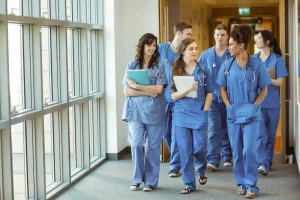How to improve learning in an outpatient clinic

The majority of medical student clinical teaching is either:
-
- At the bedside (on a ward), or
- In an outpatient clinic.
You can learn alot in either setting (shoulders, giants! etc). There are other areas where it can occur, e.g. operating theatre, small group teaching or skills laboratory. Here are some Top Tips for clinics:
Tip 1: Introduce yourself early
Tip 2: Read about conditions before (likely ones) the clinic, and after (ones seen)
Tip 3: Engage with the patient
Tip 4: Be part of the team
Tip 5: Swop clinics with student colleagues.
A bit more on each tip ..
Tip 1: Introduce yourself early
The consultant (or other senior doctor or nurse you are with) may or may not introduce you. If they don’t, do so and use a version of your name that is easy to say, e.g. “Hi. I’m John/Balvinder, and I’m a student doctor”. Sit in a way so you are in the patient’s eyeline and near enough to the doctor to see any written or computer information. Take notes if needed.

Think about where it would be best for you to sit, and where the computer is
Note. Don’t feel you will get less teaching if you are with a specialist nurse. You may learn more things especially in terms of communication skills.
Tip 2: Read about conditions before (likely ones) the clinic, and after (ones seen)
If it’s a renal clinic, for example, reading more about diabetic nephropathy and renal transplantation before and after a clinic, will improve your learning.
Note. Buy a book if the focus of that clinic is not covered in your course, especially if its a specialised clinic like haematology or nephrology. Most ‘ologies actually.
Tip 3: Engage with the patient
The doctor is likely to have a much shorter list of questions to ask compared to your history. Don’t be afraid to use silences to ask short questions that are of interest to you. It may help the doctor if you pull out information they have not.
Say “thankyou” when they leave.
Tip 4: Be part of the team
You can show you are a team player by offering the doctor and nurses coffee and cake! If the consultant or senior likes you, they are more likely to offer more teaching (say you seeing the patient first in subsequent clinics).
An example. You can say to the consultant (or doctor who you are with): “I can take her/him out and show them where to go for bloods” etc
Tip 5: Swop clinics with student colleagues
Many clinics are very specialised. So doing many of the same type of clinic in an attachment may not help that much. 6-8-ish sessions of one clinic is usually enough. More than that you will not learn much more. So swop with colleagues, especially in medical/surgical areas that you don’t think you will cover.
Oh yes. A few ‘house rules’
- If the doctor has asked you a question and you don’t know the answer, don’t say “I don’t know”. It’s better to say “That’s a challenging question, I will get back to you later” (remember to email them with the correct answer when you have done your post clinic reading)
- Don’t talk when the doctor (or nurse) is dictating
- Don’t eat and drink in front of the patient
- If there is time, volunteer to examine the patient, being watched. You can pick up small things from each doctor. Their techniques will be slightly different. Copy the ones that suit you.
Summary
We have described how to improve outpatient clinic learning, with 5 top tips. We hope these will help your learning.
Other resource
This a good article from the RCP: https://www.rcplondon.ac.uk/projects/outputs/how-make-most-out-outpatient-clinics-medical-student, on which this page is partly based.

